Burt A. The Evolution of the British Empire and Commonwealth From the American Revolution
Подождите немного. Документ загружается.

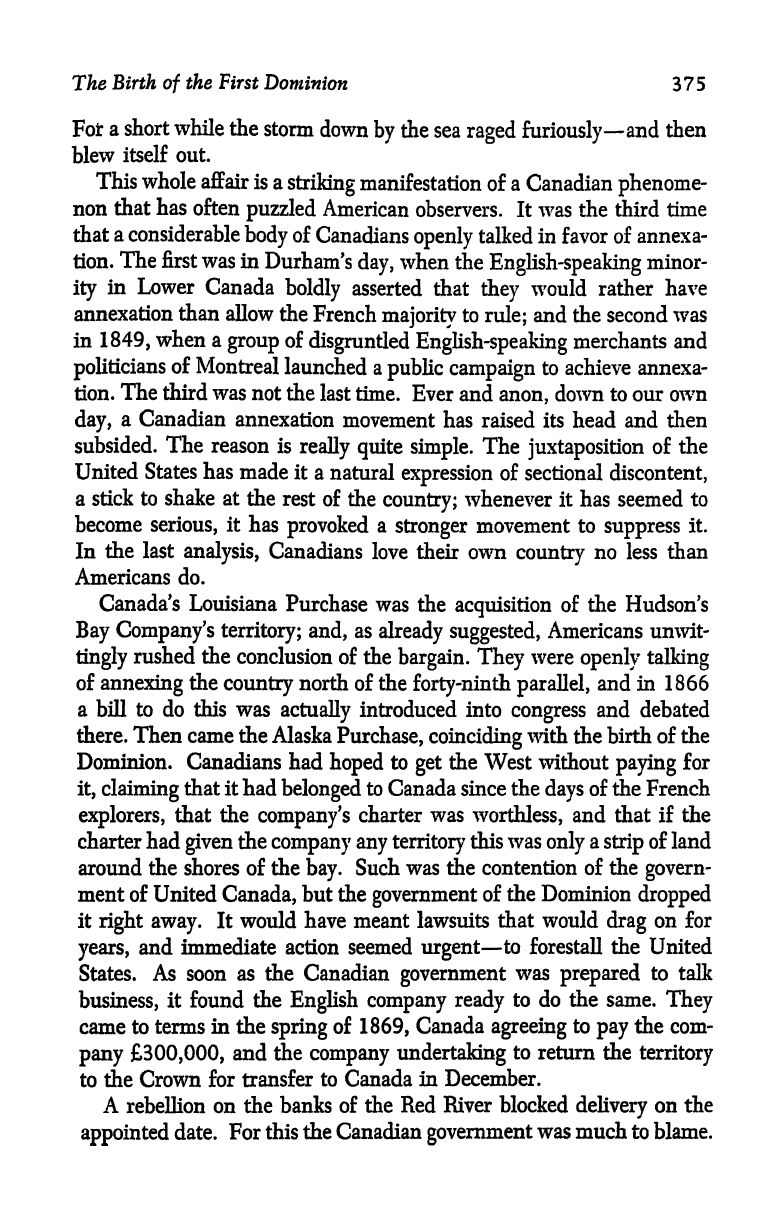
The
Birth
of
the First
Dominion
375
Foi:
a
short
while
the
storm
down
by
the sea
raged
furiously
and
then
blew
itself out.
This whole affair
is
a
striking
manifestation
of
a
Canadian
phenome-
non
that
has
often
puzzled
American observers. It
was
the third
time
that
a
considerable
body
of
Canadians
openly
talked
in
favor of
annexa-
tion.
The first
was in
Durham's
day,
when
the
English-speaking
minor-
ity
in Lower
Canada
boldly
asserted that
they
would
rather have
annexation
than
allow
the
French
majority
to
rule;
and
the second
was
in
1849,
when
a
group
of
disgruntled
English-speaking
merchants and
politicians
of
Montreal
launched
a
public
campaign
to achieve
annexa-
tion.
The third
was
not
the
last time.
Ever
and
anon,
down to our own
day,
a Canadian
annexation
movement has raised its head and then
subsided.
The
reason
is
really
quite
simple.
The
juxtaposition
of
the
United
States
has
made
it a
natural
expression
of sectional
discontent,
a stick
to shake
at
the
rest of
the
country;
whenever
it has
seemed
to
become
serious,
it
has
provoked
a
stronger
movement to
suppress
it.
In
the last
analysis,
Canadians
love
their
own
country
no less
than
Americans
do.
Canada's
Louisiana
Purchase
was the
acquisition
of
the Hudson's
Bay Company's
territory;
and,
as
already
suggested,
Americans unwit-
tingly
rushed
the
conclusion of the
bargain.
They
were
openly talking
of
annexing
the
country
north
of the
forty-ninth
parallel,
and
in
1866
a
bill
to
do
this
was
actually
introduced into
congress
and debated
there. Then
came the Alaska
Purchase,
coinciding
with
the birth
of
the
Dominion.
Canadians had
hoped
to
get
the West
without
paying
for
it,
claiming
that
it had
belonged
to Canada since the
days
of the French
explorers,
that the
company's
charter
was
worthless,
and
that if the
charter
had
given
the
company any
territory
this was
only
a
strip
of land
around the shores of the
bay.
Such
was the contention of
the
govern-
ment of United
Canada,
but the
government
of
the
Dominion
dropped
it
right
away.
It
would have meant
lawsuits
that
would
drag
on for
years,
and immediate action
seemed
urgent
to
forestall
the
United
States.
As
soon
as the Canadian
government
was
prepared
to
talk
business,
it found the
English
company
ready
to do the same.
They
came to terms
in the
spring
of
1869,
Canada
agreeing
to
pay
the
com-
pany
300,000,
and the
company undertaking
to
return the
territory
to
the
Crown
for transfer
to Canada
in
December.
A
rebellion
on the banks
of
the
Red
River blocked
delivery
on the
appointed
date. For
this
the
Canadian
government
was much
to blame.
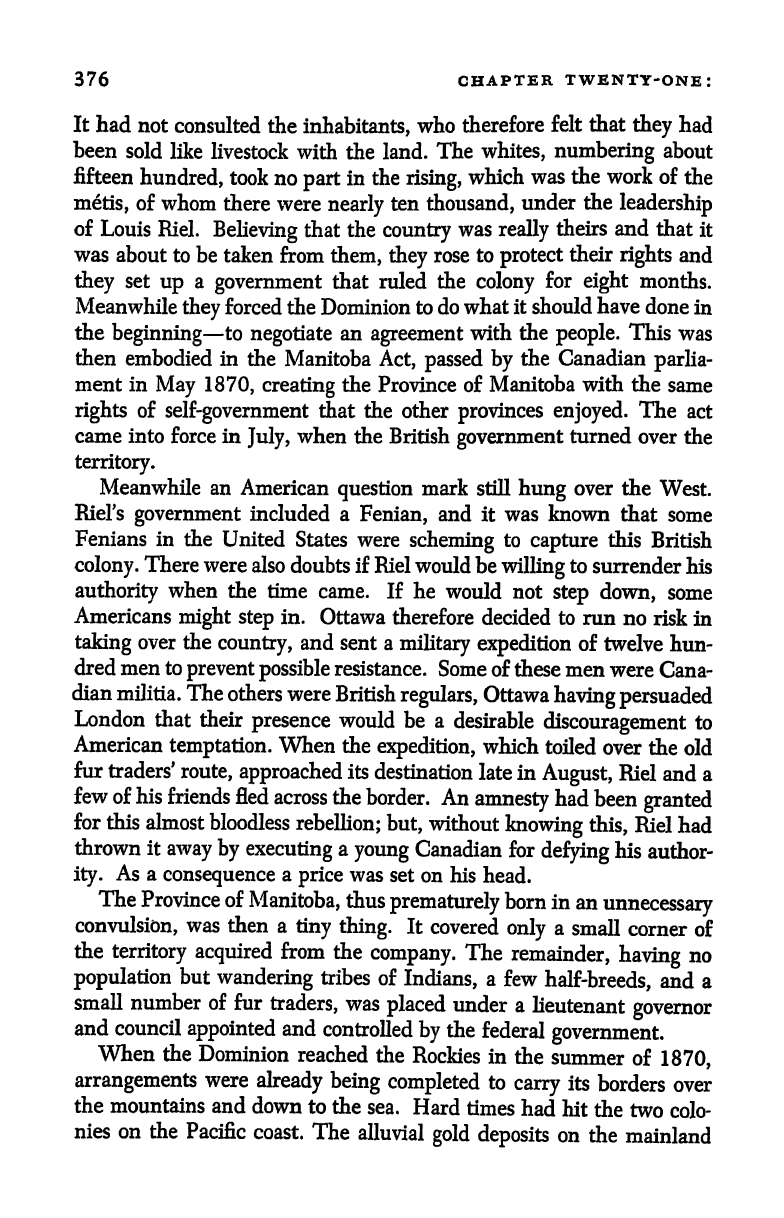
376
CHAPTER
TWENTY-ONE:
It
had
not
consulted
the
inhabitants,
who
therefore
felt that
they
had
been
sold
like
livestock with the land.
The
whites,
numbering
about
fifteen
hundred,
took
no
part
in
the
rising,
which
was the work
of
the
metis,
of
whom
there were
nearly
ten
thousand,
under
the
leadership
of
Louis
Kiel.
Believing
that the
country
was
really
theirs
and that
it
was
about to be taken
from
them,
they
rose to
protect
their
rights
and
they
set
up
a
government
that
ruled
the
colony
for
eight
months.
Meanwhile
they
forced the
Dominion
to do
what it should
have
done
in
the
beginning
to
negotiate
an
agreement
with
the
people.
This
was
then
embodied
in the
Manitoba
Act,
passed
by
the Canadian
parlia-
ment
in
May
1870,
creating
the Province of
Manitoba
with
the
same
rights
of
self-government
that the other
provinces
enjoyed.
The
act
came
into force in
July,
when
the British
government
turned
over
the
territory.
Meanwhile an
American
question
mark
still
hung
over
the
West.
Kiel's
government
included a
Fenian,
and
it
was
known
that
some
Fenians in
the
United States were
scheming
to
capture
this
British
colony.
There
were
also doubts if
Kiel
would be
willing
to
surrender
his
authority
when
the time
came. If
he
would not
step
down,
some
Americans
might step
in.
Ottawa
therefore decided to
run
no risk
in
taking
over the
country,
and
sent a
military
expedition
of
twelve
hun-
dred
men to
prevent
possible
resistance.
Some
of these
men
were
Cana-
dian
militia. The
others
were
British
regulars,
Ottawa
having persuaded
London
that
their
presence
would
be
a
desirable
discouragement
to
American
temptation.
When
the
expedition,
which
toiled over
the
old
fur
traders'
route,
approached
its
destination
late
in
August,
Kiel
and
a
few of his friends
fled
across the
border.
An
amnesty
had
been
granted
for
this almost
bloodless
rebellion;
but,
without
knowing
this,
Kiel
had
thrown
it
away
by
executing
a
young
Canadian
for
defying
his
author-
ity.
As
a
consequence
a
price
was
set
on
his
head.
The
Province of
Manitoba,
thus
prematurely
born in
an
unnecessary
convulsion,
was then
a
tiny
thing.
It
covered
only
a
small
corner
of
the
territory
acquired
from
the
company.
The
remainder,
having
no
population
but
wandering
tribes
of
Indians,
a few
half-breeds,
and a
small
number
of
fur
traders,
was
placed
under
a
lieutenant
governor
and
council
appointed
and
controlled
by
the
federal
government.
When
the
Dominion
reached
the
Rockies in
the
summer
of
1870,
arrangements
were
already
being completed
to
carry
its
borders over
the mountains
and
down
to
the
sea.
Hard
times
had
hit
the
two
colo-
nies
on
the
Pacific
coast.
The
alluvial
gold
deposits
on the
mainland
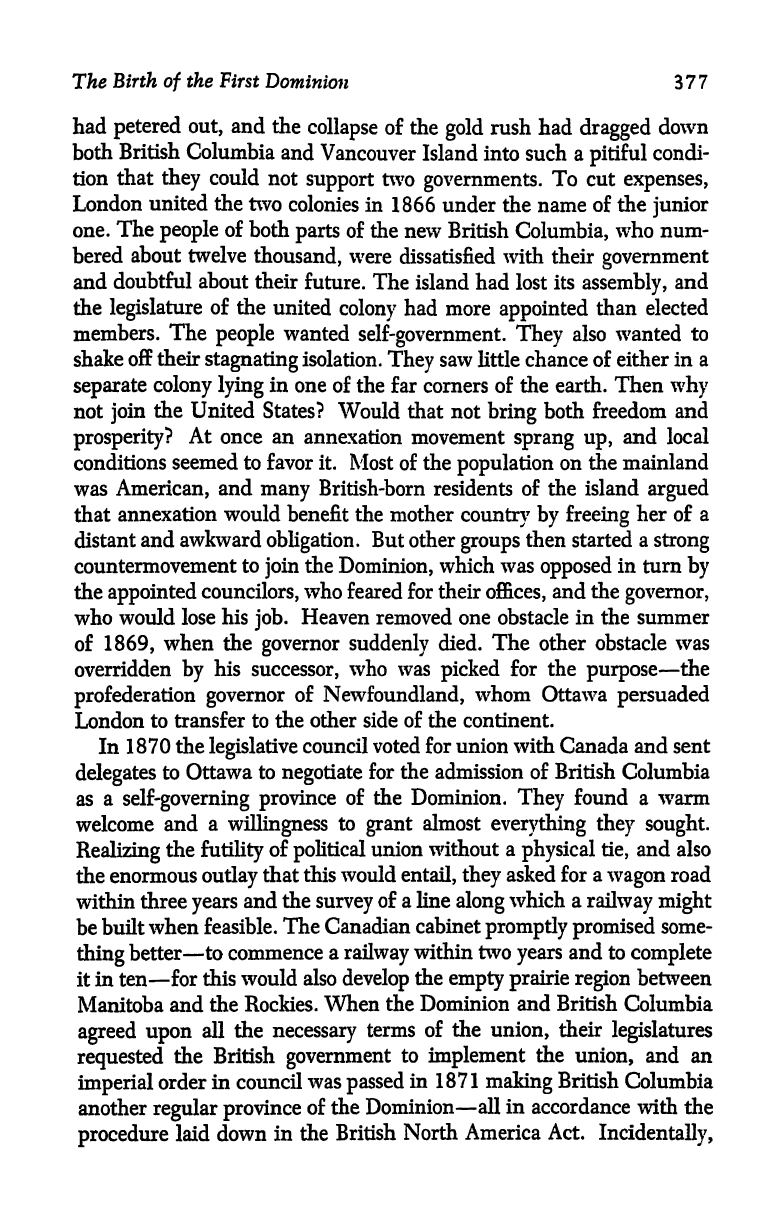
The
Birth
of
the First
Dominion
377
had
petered
out,
and
the
collapse
of
the
gold
rush had
dragged
down
both
British Columbia
and
Vancouver Island
into
such a
pitiful
condi-
tion
that
they
could
not
support
two
governments.
To cut
expenses,
London
united
the
two
colonies in
1866
under
the name of
the
junior
one.
The
people
of
both
parts
of
the
new British
Columbia,
who
num-
bered
about twelve
thousand,
were
dissatisfied
with their
government
and
doubtful
about
their
future.
The
island had
lost
its
assembly,
and
the
legislature
of the
united
colony
had more
appointed
than elected
members.
The
people
wanted
self-government.
They
also
wanted
to
shake
off
their
stagnating
isolation.
They
saw
little
chance of
either
in a
separate
colony
lying
in
one
of the
far
corners
of
the earth. Then
why
not
join
the
United
States?
Would
that
not
bring
both
freedom
and
prosperity?
At
once
an annexation
movement
sprang
up,
and local
conditions
seemed
to favor it.
Most
of
the
population
on
the
mainland
was
American,
and
many
British-born residents
of the
island
argued
that
annexation would
benefit the
mother
country
by
freeing
her of
a
distant
and
awkward
obligation.
But other
groups
then
started
a
strong
countermovement
to
join
the
Dominion,
which
was
opposed
in
turn
by
the
appointed
councilors,
who
feared
for
their
offices,
and
the
governor,
who
would lose
his
job.
Heaven removed
one
obstacle
in
the
summer
of
1869,
when
the
governor
suddenly
died.
The
other obstacle
was
overridden
by
his
successor,
who was
picked
for
the
purpose
the
profederation
governor
of
Newfoundland,
whom
Ottawa
persuaded
London
to
transfer
to the
other side of the continent.
In
1870
the
legislative
council
voted
for
union with
Canada
and
sent
delegates
to Ottawa
to
negotiate
for
the
admission of
British
Columbia
as
a
self-governing
province
of
the
Dominion.
They
found a
warm
welcome
and
a
willingness
to
grant
almost
everything
they
sought.
Realizing
the
futility
of
political
union without
a
physical
tie,
and also
the enormous
outlay
that
this
would
entail,
they
asked
for
a
wagon
road
within
three
years
and the
survey
of
a
line
along
which a
railway
might
be
built
when
feasible.
The Canadian
cabinet
promptly
promised
some-
thing
better
to
commence
a
railway
within two
years
and
to
complete
it in ten
for
this would
also
develop
the
empty prairie region
between
Manitoba
and
the Rockies.
When
the Dominion and British
Columbia
agreed
upon
all
the
necessary
terms of
the
union,
their
legislatures
requested
the British
government
to
implement
the
union,
and an
imperial
order
in
council
was
passed
in
1871
making
British
Columbia
another
regular
province
of
the
Dominion
all
in
accordance with
the
procedure
laid down
in the
British
North
America Act.
Incidentally,
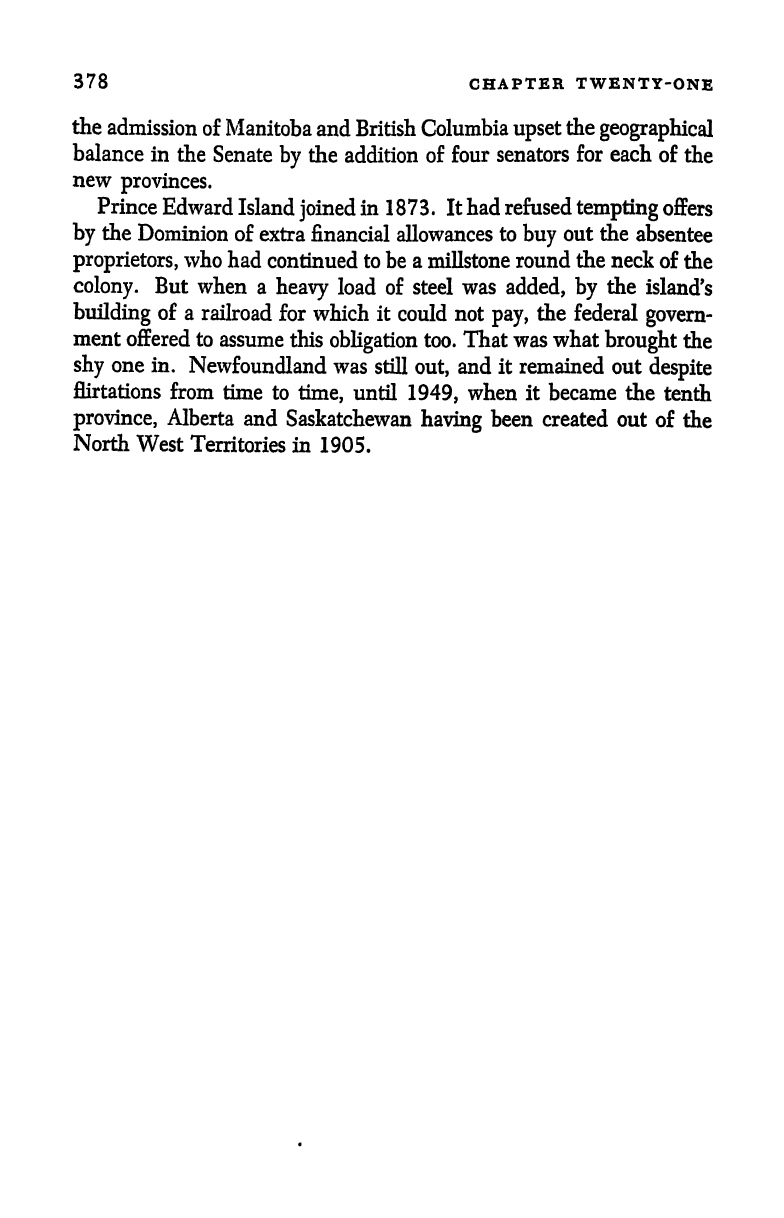
378
CHAPTER
TWENTY-ONE
the
admission
of
Manitoba and
British
Columbia
upset
the
geographical
balance
in
the
Senate
by
the
addition
of
four
senators
for each
of
the
new
provinces.
Prince
Edward
Island
joined
in 1873.
It
had
refused
tempting
offers
by
the
Dominion
of extra
financial allowances
to
buy
out
the
absentee
proprietors,
who
had
continued
to be a
millstone
round
the
neck
of
the
colony.
But
when
a
heavy
load of
steel
was
added,
by
the
island's
building
of
a
railroad
for
which it
could not
pay,
the federal
govern-
ment
offered to
assume
this
obligation
too.
That was
what
brought
the
shy
one
in.
Newfoundland
was
still
out,
and it
remained
out
despite
flirtations
from
time
to
time,
until
1949,
when it became
the
tenth
province,
Alberta
and
Saskatchewan
having
been
created out
of
the
North
West
Territories in
1905.
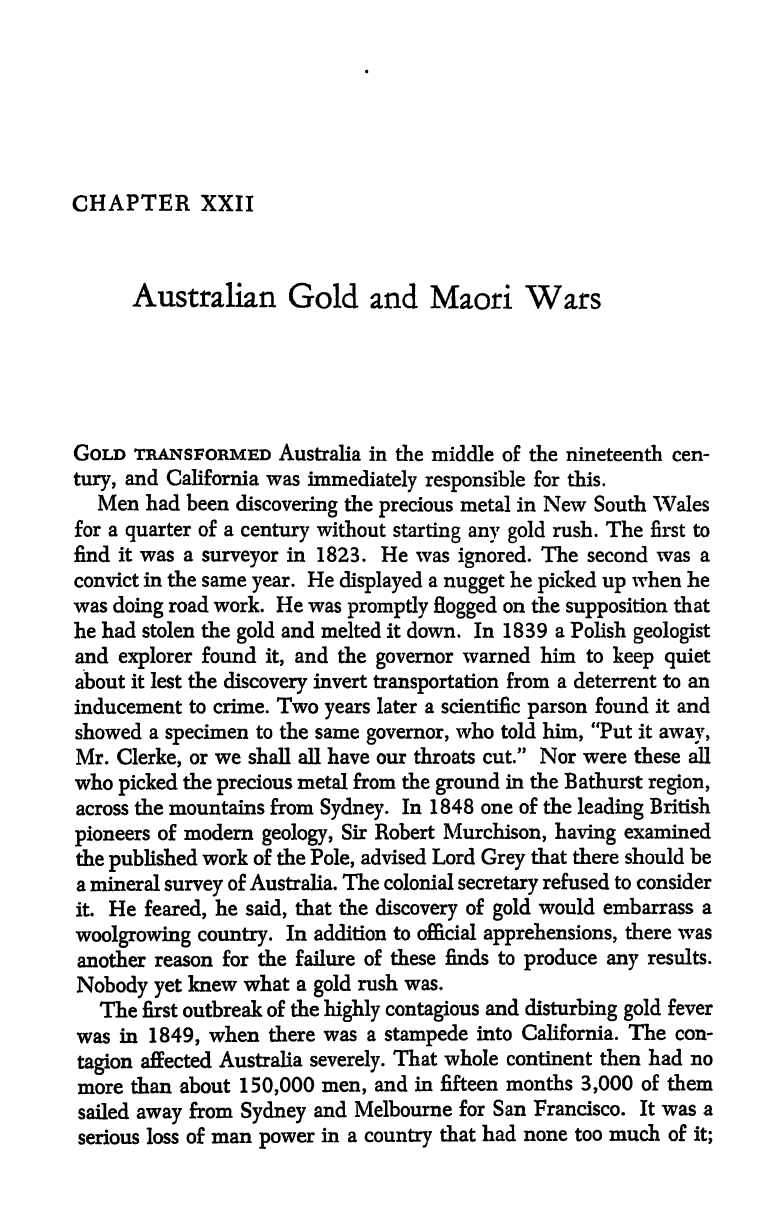
CHAPTER
XXII
Australian
Gold and
Maori
Wars
GOLD
TRANSFORMED
Australia in
the
middle of the
nineteenth
cen-
tury,
and
California
was
immediately responsible
for
this.
Men had
been
discovering
the
precious
metal
in New
South
Wales
for
a
quarter
of
a
century
without
starting
any
gold
rush.
The first
to
find
it
was
a
surveyor
in
1823. He
was
ignored.
The second
was a
convict
in
the same
year.
He
displayed
a
nugget
he
picked
up
when
he
was
doing
road work. He
was
promptly
flogged
on the
supposition
that
he
had
stolen the
gold
and melted
it
down. In
1839
a
Polish
geologist
and
explorer
found
it,
and
the
governor
warned
him to
keep
quiet
about
it
lest the
discovery
invert
transportation
from a deterrent to
an
inducement
to crime. Two
years
later
a
scientific
parson
found
it and
showed
a
specimen
to
the same
governor,
who
told
him,
"Put
it
away,
Mr.
Clerke,
or we
shall
all
have our throats
cut."
Nor were these all
who
picked
the
precious
metal
from
the
ground
in the Bathurst
region,
across
the
mountains
from
Sydney.
In 1848 one
of the
leading
British
pioneers
of
modern
geology,
Sir Robert
Murchison,
having
examined
the
published
work of the
Pole,
advised
Lord
Grey
that there
should
be
a mineral
survey
of Australia,
The colonial
secretary
refused
to consider
it.
He
feared,
he
said,
that
the
discovery
of
gold
would
embarrass
a
woolgrowing
country.
In addition
to
official
apprehensions,
there was
another
reason
for
the failure
of
these
finds to
produce
any
results.
Nobody
yet
knew
what
a
gold
rush
was.
The
first outbreak
of the
highly
contagious
and
disturbing gold
fever
was
in
1849,
when
there
was a
stampede
into
California.
The
con-
tagion
affected
Australia
severely.
That
whole
continent then had no
more
than
about
150,000
men,
and
in
fifteen
months
3,000
of them
sailed
away
from
Sydney
and
Melbourne
for
San Francisco.
It was
a
serious
loss
of
man
power
in
a
country
that
had
none
too
much of
it;
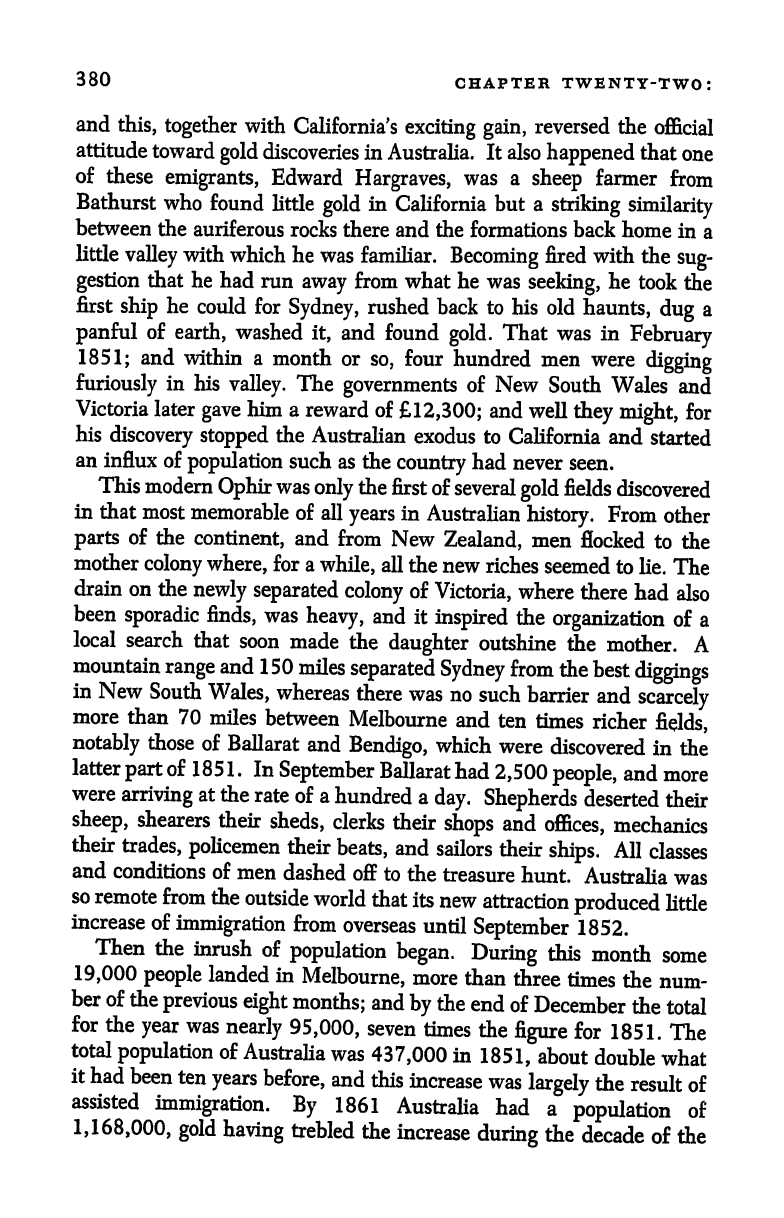
380
CHAPTER
TWENTY-TWO:
and
this,
together
with
California's
exciting
gain,
reversed
the
official
attitude
toward
gold
discoveries
in
Australia.
It
also
happened
that
one
of
these
emigrants,
Edward
Hargraves,
was
a
sheep
farmer
from
Bathurst
who
found
little
gold
in
California but a
striking
similarity
between
the
auriferous
rocks there and the formations back
home
in
a
little
valley
with
which
he
was
familiar.
Becoming
fired with
the
sug-
gestion
that
he
had run
away
from
what he was
seeking,
he
took
the
first
ship
he
could for
Sydney,
rushed back
to
his old
haunts,
dug
a
panful
of
earth,
washed
it,
and
found
gold.
That
was
in
February
1851;
and within a
month
or
so,
four
hundred
men
were
digging
furiously
in
his
valley.
The
governments
of New
South
Wales
and
Victoria
later
gave
him
a
reward
of
12,300;
and
well
they
might,
for
his
discovery
stopped
the
Australian
exodus
to
California
and
started
an
influx of
population
such
as
the
country
had
never
seen.
This
modern
Ophir
was
only
the
first
of
several
gold
fields
discovered
in
that
most
memorable
of
all
years
in
Australian
history.
From
other
parts
of
the
continent,
and
from
New
Zealand,
men
flocked
to
the
mother
colony
where,
for
a
while,
all
the new
riches
seemed
to
lie.
The
drain
on the
newly
separated
colony
of
Victoria,
where
there
had
also
been
sporadic
finds,
was
heavy,
and
it
inspired
the
organization
of
a
local
search
that
soon
made
the
daughter
outshine
the
mother.
A
mountain
range
and
150
miles
separated
Sydney
from
the
best
diggings
in
New
South
Wales,
whereas
there
was
no
such
barrier
and
scarcely
more
than 70
miles
between
Melbourne
and
ten
times
richer
fields,
notably
those
of
Ballarat
and
Bendigo,
which
were
discovered
in
the
latter
part
of
1
85
1 .
In
September
Ballarat
had
2,500
people,
and
more
were
arriving
at
the
rate
of
a
hundred
a
day.
Shepherds
deserted
their
sheep,
shearers
their
sheds,
clerks
their
shops
and
offices,
mechanics
their
trades,
policemen
their
beats,
and
sailors
their
ships.
All
classes
and
conditions
of
men
dashed off
to
the
treasure
hunt.
Australia
was
so
remote
from
the
outside
world
that
its
new
attraction
produced
little
increase
of
immigration
from
overseas
until
September
1852.
Then
the
inrush
of
population
began.
During
this
month
some
19,000
people
landed
in
Melbourne,
more
than
three
times
the
num-
ber of the
previous
eight
months;
and
by
the
end
of
December
the
total
for
the
year
was
nearly
95,000,
seven
times
the
figure
for
1851.
The
total
population
of
Australia
was
437,000
in
1851,
about
double
what
it
had
been
ten
years
before,
and
this
increase
was
largely
the
result
of
assisted
immigration.
By
1861
Australia
had
a
population
of
1,168,000,
gold
having
trebled
the
increase
during
the
decade
of
the
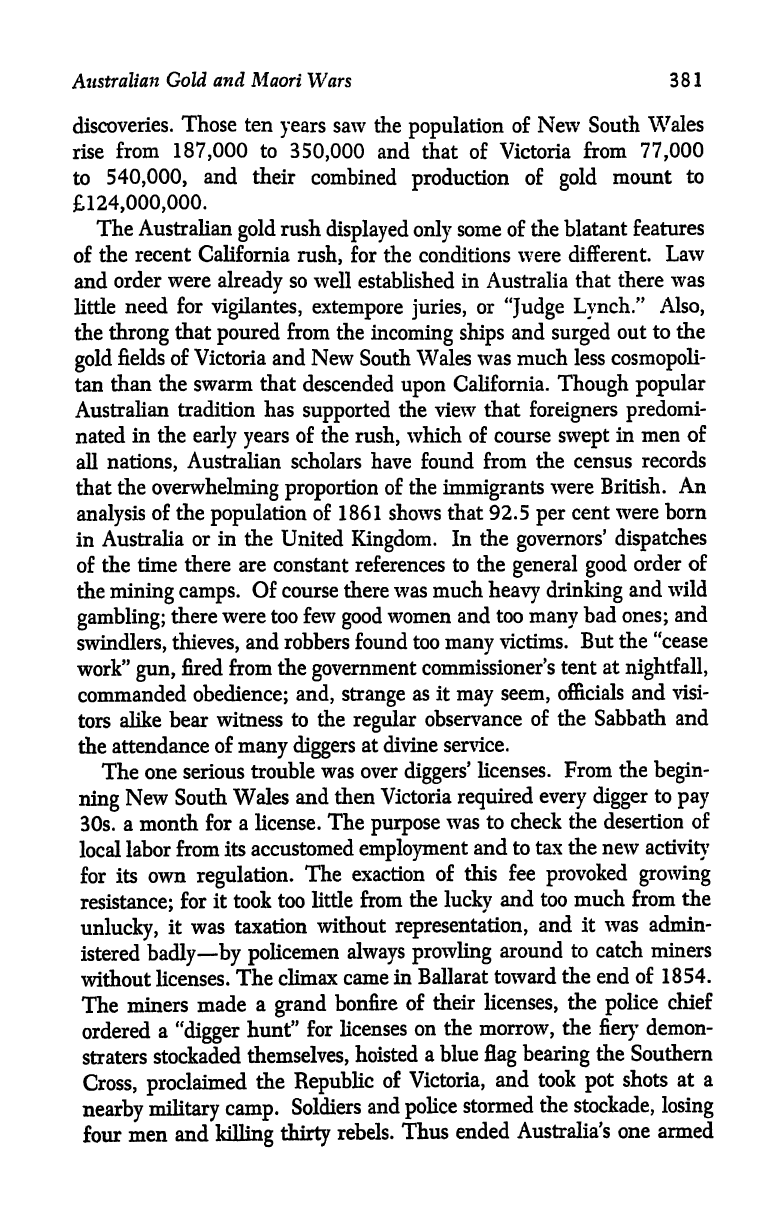
Australian
Gold
and
Maori
Wars
381
discoveries.
Those ten
years
saw
the
population
of
New
South
Wales
rise
from
187,000
to
350,000
and that
of
Victoria
from
77,000
to
540,000,
and
their
combined
production
of
gold
mount
to
124,000,000.
The
Australian
gold
rush
displayed only
some
of
the blatant
features
of
the
recent
California
rush,
for
the conditions
were
different.
Law
and
order
were
already
so
well established
in
Australia
that
there
was
little
need for
vigilantes, extempore juries,
or
"Judge
Lynch."
Also,
the
throng
that
poured
from the
incoming ships
and
surged
out
to the
gold
fields
of
Victoria
and New
South Wales
was
much less
cosmopoli-
tan
than
the
swarm
that
descended
upon
California.
Though
popular
Australian
tradition has
supported
the view
that
foreigners
predomi-
nated
in the
early
years
of
the
rush,
which of
course
swept
in men of
all
nations,
Australian
scholars
have
found
from
the census
records
that
the
overwhelming
proportion
of
the
immigrants
were
British.
An
analysis
of the
population
of 1861 shows
that 92.5
per
cent
were born
in
Australia
or
in
the
United
Kingdom.
In
the
governors'
dispatches
of
the
time
there are
constant
references
to the
general
good
order of
the
mining
camps.
Of course there
was much
heavy
drinking
and
wild
gambling;
there
were too
few
good
women and
too
many
bad
ones;
and
swindlers, thieves,
and robbers
found too
many
victims.
But the "cease
work"
gun,
fired from
the
government
commissioner's
tent
at
nightfall,
commanded
obedience;
and,
strange
as
it
may
seem,
officials and
visi-
tors
alike
bear
witness to the
regular
observance
of the Sabbath
and
the
attendance
of
many
diggers
at divine
service.
The one
serious
trouble
was
over
diggers'
licenses.
From the
begin-
ning
New
South
Wales
and
then
Victoria
required
every
digger
to
pay
30s.
a month
for
a
license.
The
purpose
was to check
the desertion
of
local
labor
from its
accustomed
employment
and to
tax
the
new
activity
for
its
own
regulation.
The
exaction
of
this
fee
provoked growing
resistance;
for
it took
too
little
from
the
lucky
and too
much from
the
unlucky,
it
was taxation
without
representation,
and
it
was admin-
istered
badly
by
policemen
always prowling
around
to catch
miners
without
licenses.
The climax
came
in
Ballarat
toward
the
end
of
1854.
The
miners
made
a
grand
bonfire
of
their
licenses,
the
police
chief
ordered
a
"digger
hunt"
for
licenses
on
the
morrow,
the
fiery
demon-
straters
stockaded
themselves,
hoisted
a
blue
flag bearing
the Southern
Cross,
proclaimed
the
Republic
of
Victoria,
and took
pot
shots
at a
nearby
military
camp.
Soldiers
and
police
stormed
the
stockade,
losing
four
men
and
Trilling
thirty
rebels.
Thus
ended
Australia's one
armed
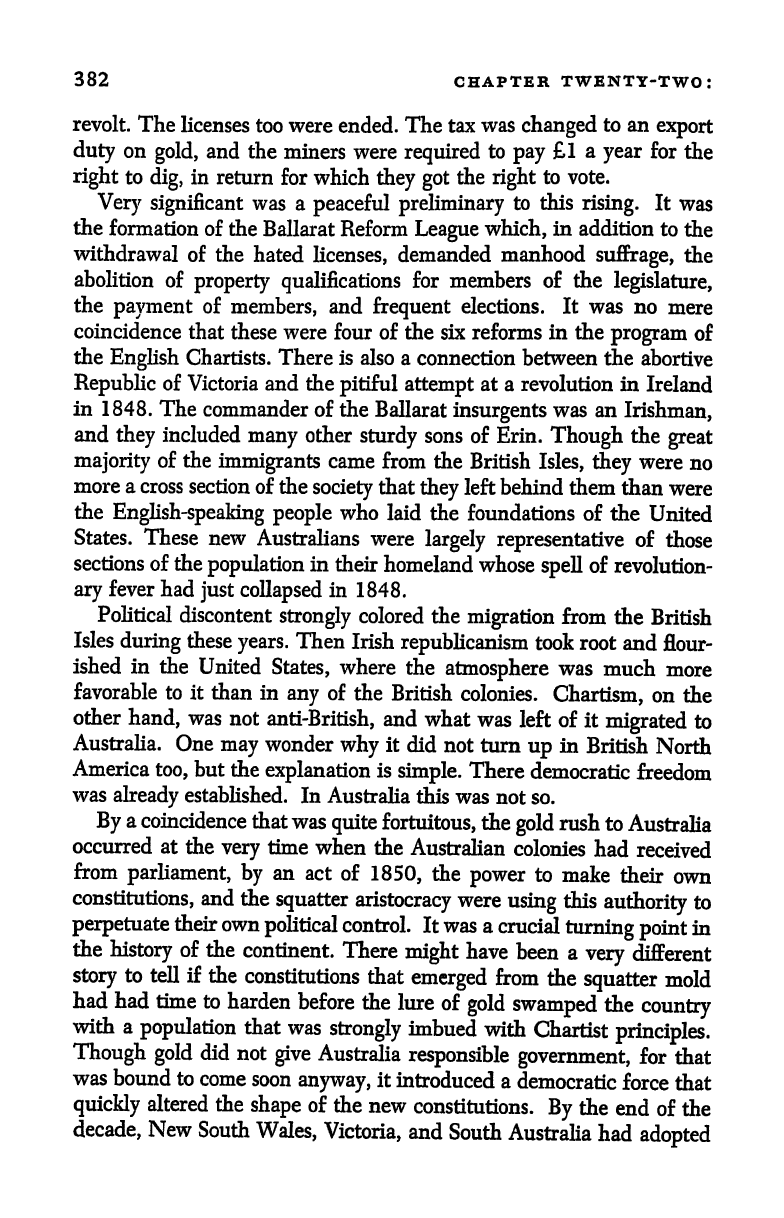
382
CHAPTER
TWENTY-TWO:
revolt.
The
licenses
too were
ended.
The tax
was
changed
to
an
export
duty
on
gold,
and
the
miners were
required
to
pay
1 a
year
for
the
right
to
dig,
in
return
for
which
they got
the
right
to vote.
Very
significant
was
a
peaceful
preliminary
to
this
rising.
It
was
the
formation
of the
Ballarat Reform
League
which,
in
addition
to
the
withdrawal of the
hated
licenses,
demanded
manhood
suffrage,
the
abolition
of
property qualifications
for members of
the
legislature,
the
payment
of
members,
and
frequent
elections.
It was
no
mere
coincidence
that these were
four of the
six reforms
in the
program
of
the
English
Chartists. There
is
also a
connection
between
the
abortive
Republic
of Victoria and the
pitiful
attempt
at a
revolution in
Ireland
in
1848.
The
commander
of the
Ballarat
insurgents
was an
Irishman,
and
they
included
many
other
sturdy
sons
of
Erin.
Though
the
great
majority
of the
immigrants
came
from the
British
Isles,
they
were
no
more
a
cross
section
of
the
society
that
they
left behind them
than
were
the
English-speaking
people
who
laid
the
foundations
of the
United
States.
These new
Australians were
largely
representative
of
those
sections
of the
population
in
their
homeland
whose
spell
of
revolution-
ary
fever
had
just
collapsed
in
1848.
Political
discontent
strongly
colored the
migration
from
the
British
Isles
during
these
years.
Then
Irish
republicanism
took root
and
flour-
ished
in
the
United
States,
where
the
atmosphere
was
much
more
favorable
to
it than
in
any
of the
British
colonies.
Chartism,
on
the
other
hand,
was
not
anti-British,
and
what
was
left
of
it
migrated
to
Australia.
One
may
wonder
why
it
did not turn
up
in
British
North
America
too,
but
the
explanation
is
simple.
There
democratic
freedom
was
already
established.
In
Australia
this was
not
so.
By
a
coincidence
that
was
quite
fortuitous,
the
gold
rush
to
Australia
occurred
at the
very
time
when
the
Australian
colonies
had
received
from
parliament,
by
an
act
of
1850,
the
power
to
make
their
own
constitutions,
and
the
squatter
aristocracy
were
using
this
authority
to
perpetuate
their
own
political
control.
It
was
a
crucial
turning point
in
the
history
of the
continent.
There
might
have
been
a
very
different
story
to
tell
if
the
constitutions
that
emerged
from
the
squatter
mold
had
had
time
to
harden
before the
lure
of
gold
swamped
the
country
with
a
population
that
was
strongly
imbued with
Chartist
principles.
Though
gold
did not
give
Australia
responsible
government,
for
that
was
bound
to
come
soon
anyway,
it
introduced
a
democratic
force that
quickly
altered
the
shape
of
the
new
constitutions.
By
the
end
of the
decade,
New
South
Wales,
Victoria,
and
South
Australia
had
adopted
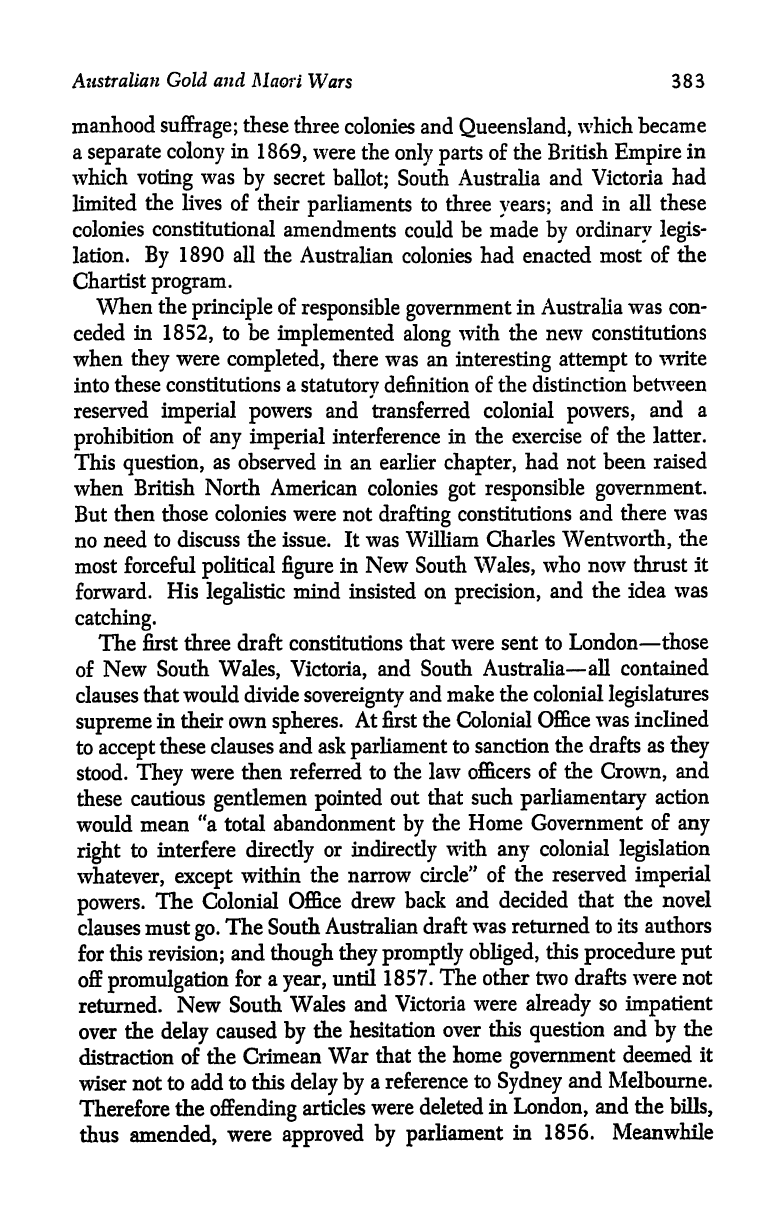
Australian
Gold and
Maori
Wars 383
manhood
suffrage;
these
three
colonies and
Queensland,
which became
a
separate
colony
in
1869,
were the
only parts
of the
British
Empire
in
which
voting
was
by
secret
ballot;
South Australia
and
Victoria
had
limited
the lives
of their
parliaments
to three
years;
and
in
all
these
colonies
constitutional
amendments
could
be made
by
ordinary
legis-
lation.
By
1890
all
the
Australian colonies had
enacted
most
of
the
Chartist
program.
When
the
principle
of
responsible
government
in Australia
was
con-
ceded
in
1852,
to be
implemented
along
with the
new constitutions
when
they
were
completed,
there was an
interesting
attempt
to
write
into
these constitutions
a
statutory
definition of
the distinction
between
reserved
imperial
powers
and
transferred
colonial
powers,
and
a
prohibition
of
any
imperial
interference
in
the
exercise of
the latter.
This
question,
as
observed
in
an earlier
chapter,
had not been
raised
when
British
North
American
colonies
got responsible
government.
But
then
those
colonies
were
not
drafting
constitutions
and
there
was
no
need
to
discuss
the
issue.
It
was
William Charles
Wentworth,
the
most
forceful
political
figure
in
New
South
Wales,
who now
thrust it
forward.
His
legalistic
mind
insisted
on
precision,
and
the idea
was
catching.
The
first three draft constitutions
that
were sent to
London
those
of
New
South
Wales, Victoria,
and South
Australia
all
contained
clauses
that would divide
sovereignty
and
make the colonial
legislatures
supreme
in their
own
spheres.
At first the Colonial Office
was
inclined
to
accept
these clauses and
ask
parliament
to
sanction
the
drafts
as
they
stood.
They
were
then referred to
the law officers
of the
Crown,
and
these
cautious
gentlemen
pointed
out
that
such
parliamentary
action
would
mean
"a
total
abandonment
by
the
Home
Government
of
any
right
to
interfere
directly
or
indirectly
with
any
colonial
legislation
whatever,
except
within
the narrow
circle" of
the reserved
imperial
powers.
The Colonial Office
drew
back and
decided
that the novel
clauses
must
go.
The South
Australian
draft
was returned to
its authors
for this
revision;
and
though
they
promptly
obliged,
this
procedure put
off
promulgation
for
a
year,
until
1857.
The other two drafts
were not
returned.
New South
Wales
and Victoria
were
already
so
impatient
over
the
delay
caused
by
the
hesitation
over
this
question
and
by
the
distraction
of
the Crimean
War
that the
home
government
deemed
it
wiser not
to
add
to
this
delay
by
a
reference
to
Sydney
and
Melbourne.
Therefore
the
offending
articles
were deleted
in
London,
and
the
bills,
thus
amended,
were
approved
by parliament
in 1856. Meanwhile
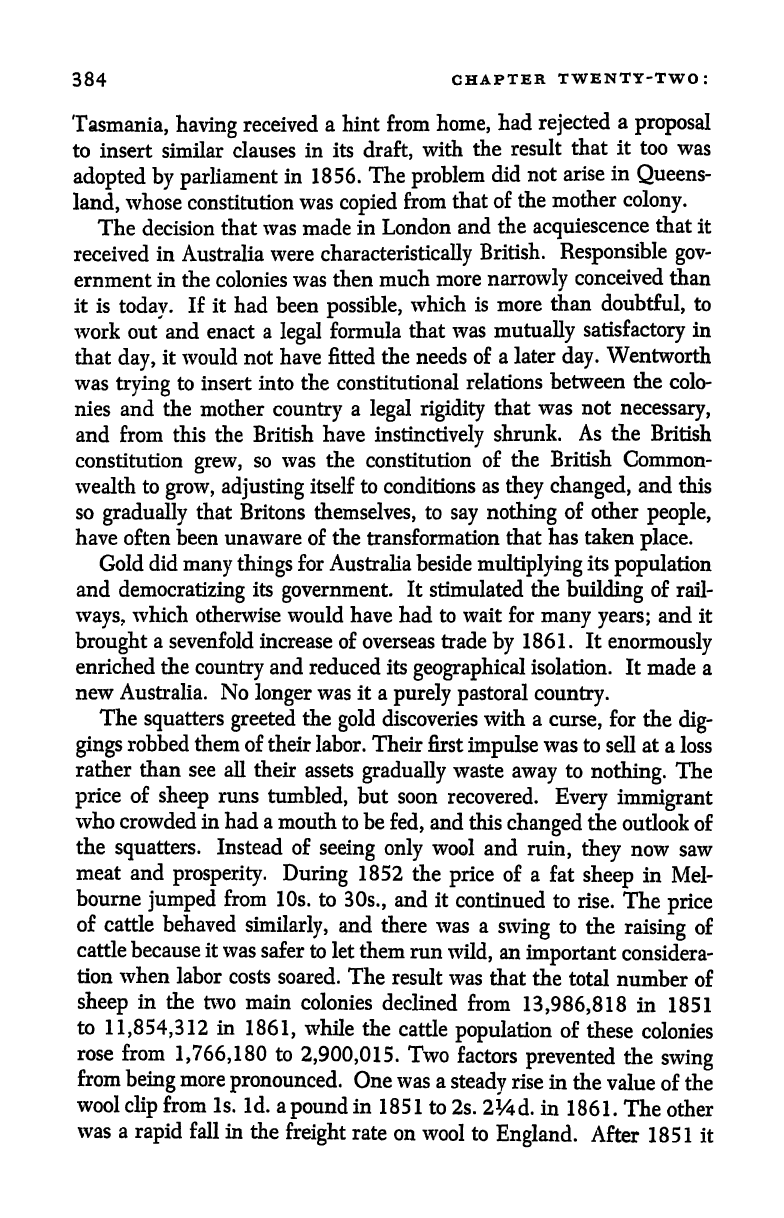
384
CHAPTER
TWENTY-TWO:
Tasmania,
having
received
a hint from
home,
had
rejected
a
proposal
to
insert similar clauses
in
its
draft,
with
the
result
that
it
too
was
adopted by
parliament
in
1856.
The
problem
did
not
arise
in
Queens-
land,
whose
constitution
was
copied
from
that
of
the
mother
colony.
The
decision
that
was made
in London
and
the
acquiescence
that
it
received
in Australia were
characteristically
British.
Responsible
gov-
ernment in the colonies
was
then
much
more
narrowly
conceived
than
it
is
today.
If
it
had been
possible,
which
is
more
than
doubtful,
to
work
out and enact
a
legal
formula
that
was
mutually satisfactory
in
that
day,
it
would not
have
fitted
the needs
of
a later
day.
Wentworth
was
trying
to
insert
into the constitutional
relations
between
the
colo-
nies
and the mother
country
a
legal rigidity
that
was
not
necessary,
and from
this the British
have
instinctively
shrunk.
As
the
British
constitution
grew,
so
was
the
constitution
of
the
British
Common-
wealth to
grow, adjusting
itself to conditions
as
they
changed,
and
this
so
gradually
that
Britons
themselves,
to
say
nothing
of
other
people,
have
often been unaware of the
transformation
that
has
taken
place.
Gold
did
many
things
for
Australia beside
multiplying
its
population
and
democratizing
its
government.
It
stimulated
the
building
of
rail-
ways,
which otherwise
would have had to
wait for
many
years;
and it
brought
a
sevenfold increase
of overseas trade
by
1861. It
enormously
enriched
the
country
and
reduced
its
geographical
isolation.
It
made
a
new Australia.
No
longer
was
it a
purely pastoral
country.
The
squatters
greeted
the
gold
discoveries
with a
curse,
for
the
dig-
gings
robbed them
of
their labor. Their
first
impulse
was
to sell at
a
loss
rather than
see
all their
assets
gradually
waste
away
to
nothing.
The
price
of
sheep
runs
tumbled,
but soon
recovered.
Every
immigrant
who
crowded
in
had
a
mouth
to be
fed,
and
this
changed
the
outlook of
the
squatters.
Instead
of
seeing only
wool
and
ruin,
they
now
saw
meat and
prosperity.
During
1852
the
price
of a
fat
sheep
in
Mel-
bourne
jumped
from 10s.
to
30s.,
and it
continued
to
rise. The
price
of
cattle behaved
similarly,
and
there was a
swing
to
the
raising
of
cattle
because it
was
safer
to let
them
run
wild,
an
important
considera-
tion
when
labor costs
soared.
The
result
was
that
the
total
number of
sheep
in
the
two main
colonies
declined from
13,986,818
in 1851
to
11,854,312
in
1861,
while
the
cattle
population
of
these
colonies
rose from
1,766,180
to
2,900,015.
Two
factors
prevented
the
swing
from
being
more
pronounced.
One was a
steady
rise
in
the
value
of the
wool
clip
from
Is.
Id. a
pound
in
1851
to 2s.
2^4 d.
in
1861.
The
other
was
a
rapid
fall
in
the
freight
rate on
wool
to
England.
After 1851 it
